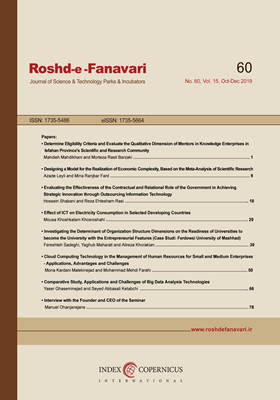Determine Eligibility Criteria and Evaluate the Qualitative Dimension of Mentors in Knowledge Enterprises in Isfahan Province's Scientific and Research Community
Subject Areas : Science and Technology Parks and IncubatorsMahdieh mahdikhani 1 , Morteza rasti bozorki 2
1 -
2 -
Keywords: Mentoring Mentor Mentee Science and Technology Park Knowledge Enterprises,
Abstract :
Today's organizations operate in a completely challengeable and complex environment. Moreover, they are constantly trying to adopt new approaches to the development, preservation and maintenance of human resources as the most important organizational capital in order to remain competitive. Mentoring is the art of facilitating the implementation of activities, the process of learning and personal development. In other words, mentoring can be defined as a technique which provides a new approach for organizations in order to conduct human resource in a conventional manner to attain the organization’s goal. The purpose of this study is to investigate the mentoring approach and to evaluate the qualitative dimension of mentors in Isfahan Province's scientific and research community. For evaluating the mentors, at first, the protocols related to the assessment and prioritization of values were given to the mentors in order to define the most important factors based on their responses. Based on their opinions and the most significant factors, a questionnaire was developed and the approach was conducted in a sample of 20 manufacturing-service companies in Isfahan. Validity and reliability of the questionnaire were verified. Descriptive statistics were used to analyze the data, and also the SPSS was used to perform statistical tests. The obtained results prove that the mentors have generally performed at a moderate and good level in the framework of the mentoring approach. According to the single-group t-test, most of the defined factors are convenient in mentors’ performance evaluation in a negligible difference.
1- شادان، سعيد، پورسراجيان، داريوش و زارع، رامين، "تحليل و طراحي ساختار مناسب پارکهاي علم و فناوري ايران،" مجله رشد فناوري، شماره 37، ص 22-33، 1392.
2- آییننامه تأسیس و راهاندازی پارکهای علم و فناوری، وزارت علوم، تحقیقات و فناوری، مصوب 17/12/81، مقدمه، بازیابیشده در تاریخ 24 اردیبهشت 1393، از: http://research.atu.ac.ir/Files/56/News/1.pdf
3- اساسنامه پارک علم و فناوری دانشگاه تهران، دانشگاه تهران، مصوب 7/8/84، فصل دوم، تعاریف، 1384.
4- مهدوی، حمید، شیخ زینالدین، محمود و اشرفیزاده، فخرالدین، "شاخصهای مهم در فرایند پذیرش مؤسسات انکوباتوری،" مجله رشد فناوری، شماره 15، ص 23-28، 1387.
5- صفايي، ناصر، طالقانينيا، فرشته و كيامنش، احمد، "شناسايي و رتبهبندي عوامل کليدي موفقيت مديريت دانش در شرکتهاي دانشبنيان (مطالعه موردي: پارک علم و فناوري دانشگاه تهران)،" مجله رشد فناوري، شماره 50، ص 21-28، 1396.
6- تاري، مهديه، مرادي، محمود و ابراهيمپور، مصطفي، "بررسي عوامل مؤثر بر رشد و موفقيت شركتهاي دانشبنيان،" مجله رشد فناوري، شماره 45، ص 36-44، 1394.
7- کریمی مونقی، حسین و یزدیمقدم، حمیده، "الگومداری و منتورینگ (مربیگری) در آموزش پرستاری: یک مطالعه مروری،" پژوهش در آموزش علوم پزشكي، شماره 1، ص ۵۹-۷۱، 1393.
8- دانشمندي، سميه، فتحي واجارگاه، كوروش، خراساني، اباصلت و قليچلي، بهروز، "واکاوي اقدامات منتور و منتي در منتورينگ اعضاي هيأتعلمي جديدالاستخدام دانشگاهها: رويکردي کيفي،" آموزش و توسعه منابع انساني، شماره 14، ص 29-55، 1396.
9- میرباقر آجرپز، ندا، زاغری تفرشی، منصوره، محتشمی، جمیله و زایری، فرید، "منتورینگ در آموزش دانشجویان اتاق عمل: یک مرور نظاممند،" آموزش پرستاری، شماره 3، ص ۴۷-۵۴، 1395.
10- حقانی، فریبا و علوی، اعظم، "اهمیت کاربرد یادگیری مبتنی بر خدمات در آموزش بالینی پرستاری،" مجله ایرانی آموزش در علوم پزشکی، شماره 9، ص ۱۴۸۷-۱۴۹۵، 1390.
11- محمدي، الهه، اميني، ميترا، مؤدب، ندا، جعفري، محمدمراد و فرجپور، آرزو، "ويژگيهاي يک منتور ايدهآل از ديدگاه اساتيد باليني دانشگاه علوم پزشکي شيراز"، مجله دانشگاهي يادگيري الكترونيكي، شماره 2، ص 20-25، 1393.
12- G. Gorman, and S. McCarthy, "Business development support and knowledge-based businesses" The Journal of Technology Transfer, 31(1), pp. 131-143, (2006).
13- R. Shankar, M. D. Singh, A. Gupta, and R. Narain, "Strategic planning for knowledge management implementation in engineering firms" Work Study, 52(4), pp.190-200, (2003).
14- S. Cho, R. H. Woods, S. S. Jang, and M. Erdem, "Measuring the impact of human resource management practices on hospitality firms’ performances" International Journal of Hospitality Management, 25(2), pp. 262-277, (2006).
15- M. Rousseau, "Structured mentoring for sure success", Pennwell books. (2008).
16- J. L. Peters, "Enhancing leadership skills through mentoring" The Agricultural education magazine (USA), 64(5), pp. 7-9, (1991).
17- K. Klasen, and D. Clutterbuck, "Implementing Mentoring Schemes; A practical guide to successful programs" Elsevier Butterworth-Heinemann, (2002).
18- N. Klasen, and D. Clutterbuck, "Implementing Mentoring Schemes, a Practical Guide to Successful Programs. Routledge", (2012).
19- R. A. Noe, J. R. Hollenbeck, B. Gerhart, and P. M. Wright, "Fundamentals of Human Resource Management", Fourth Edition. McGraw-Hill/Irwin.
20- J. Field, "Mentoring: A natural act for information professionals?", New Library World, 102(7/8), 269-273.
21- O. A. Lawal, "An Evaluation of Mentoring In Organizations: Nigerian Peculiarities" IFE PsychologIA: An International Journal, 2011(1), pp. 379-397, (2011).
22- E. W. Hart, "Seven keys to successful mentoring. Center for Creativen Leadership" (2009).
23- B.R. Ragins, and J.L. Cotton, "Mentor functions and outcomes: a comparison of men and women in formal and informal mentoring relationships" Journal of Applied Psychology,84, 529-50, (1999).
24- B. Gillian, "Learning to lead in the 'year of the firsts': a study of employer led mentoring for new school leaders in Scotland. (Doctoral dissertation). University of Glasgow.
25- P. R. Hallam, P. N. Chou, J. M. Hite, and S. J. Hite, "Beginning Teachers Two Contrasting Models for Mentoring as They Affect Retention of Beginning Teachers" NASSP Bulletin,96(3), pp. 243–278, (2012).
26- L. Lunsford, V. Baker, and M. Pifer, "Faculty mentoring faculty: career stages, relationship quality, and job satisfaction" International Journal of Mentoring and Coaching in Education, 7(2), pp. 139-154, (2018).
27- P. Sinclair, J. E. F. Fitzgerald, S. T. Hornby, and J. Shalhoub, "Mentorship in surgical training: current status and a needs assessment for future mentoring programs in surgery" World journal of surgery, 39(2), pp. 303-313, (2015).
28- http://www.padidehtabar.com/fa/news
29- J. H. Moore, and Z. Wang, "Mentoring Top Leadership Promotes Organizational Innovativeness through Psychological Safety and Is Moderated by Cognitive Adaptability" Frontiers in psychology, 8, 318. doi:10.3389/fpsyg.2017.00318, (2017).


